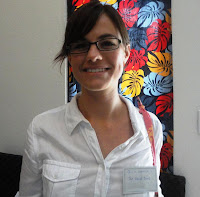Rosalie Nongebatu - Solomon Islands Broadcasting Corporation
Apia, Samoa - Traditional institutions are vital in the governance of natural cultural resources when it comes to implementing community-based responses to Climate Change Adaptation and Disaster Risk Management, particularly in the pacific, where most of the land or islands are under customary land ownership.
 |
| Robin James, The Nature Conservancy |
Robin James of The Nature Conservancy Organization was speaking this morning at the Lessons for Future Action Conference on the organization’s experiences on a particular project being run in Choiseul Province in the North-Western region of the Solomon Islands.
Ms James says Chiefs and traditional leaders from across the island gathered in the provincial capital, taro, in 2008 for the Lauru Land Conference and Tribal Community where they declared a system of protected areas, both marine and terrestrial areas over the whole island of Choiseul.
She says the arrangement has been developed since over the years with participation from the community level.
“In February this year the TNC undertook a number of participatory activities in a small community in the province known as Mboemboe, to understand what this would look like and further visualise what the protected networks are and also in the context of climate change for the whole island”.
The number of participatory tools implemented with partners consisted of household surveys, participatory videos where members of the communities were given videos to film their own experiences in climate change and also development of conservation issues in the community.
“Household surveys were done to understand the economics of climate change, the costs, the current status and what those future costs would be, making it a major economic component of the project .”
The project also had a participatory 3 dimensional modeling focus which combines local spatial knowledge, mind maps of familiar settings, at the same time combining the scientific component of GIS.
The participatory 3D modeling (P3DM) involved more half of the community, including women and children and combined community mapping with open discussions on land-use and land-use planning scenarios.
During a ten day P3DM exercise, participants helped construct a physical, hands-on scale model made of wood-and paper model of their community, led by an expert in P3DM from the University of Wollongong and the University of Queensland with Melanesians.
Many people were involved in these activities from community members, government, local and regional TNC staff, scientists, local NGOs as well as partners from other parts of Melanesia.
She said It is anticipated that by 2012 every community in Choiseul should have a plan that includes adaptation and should have begun an initial set of activities.
According to Ms James’ presentation, lessons learned from these activities will be spread by participants and through visual outputs such as video to inform future work in Melanesia and Micronesia and elsewhere in the Pacific.









